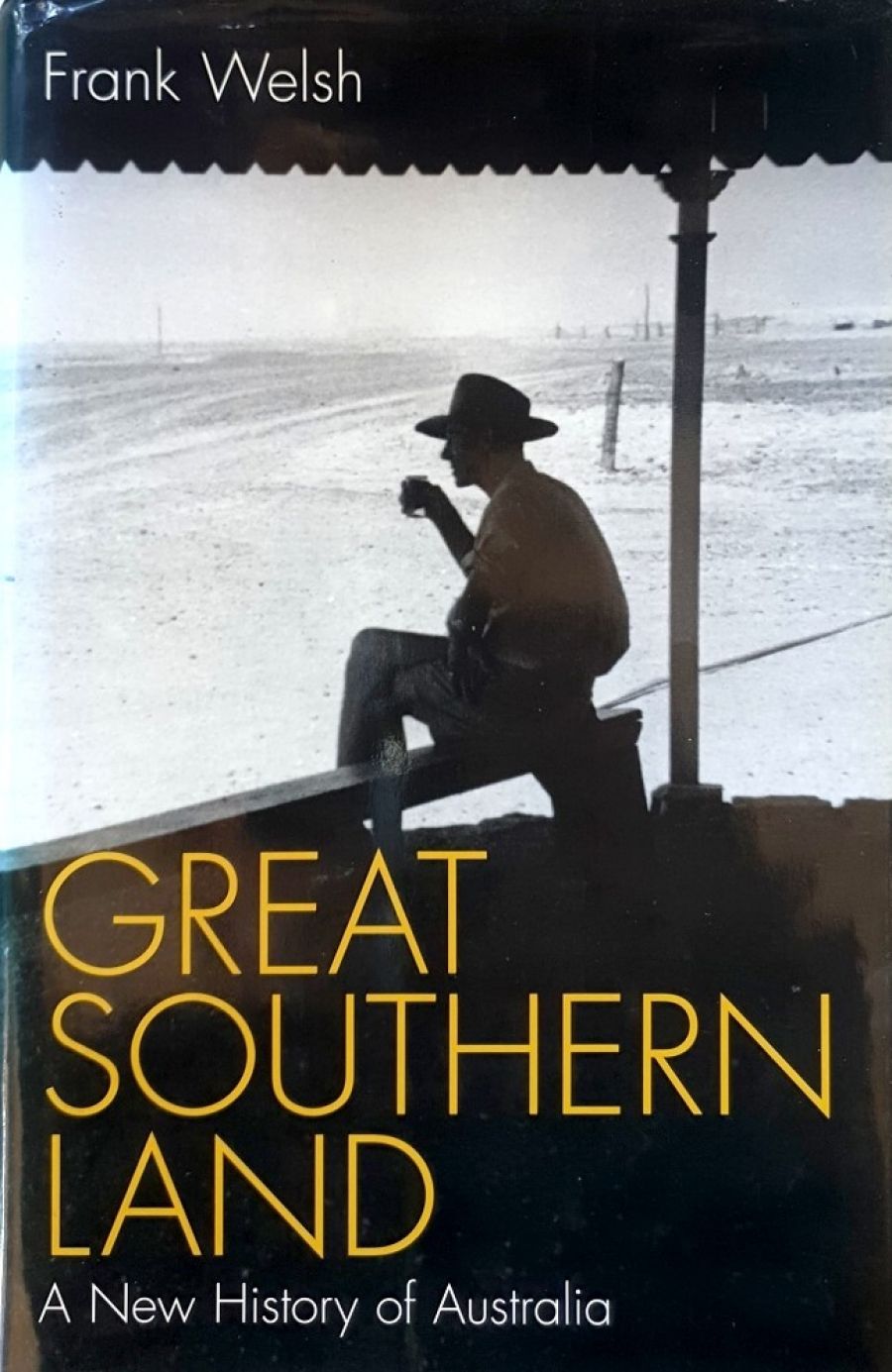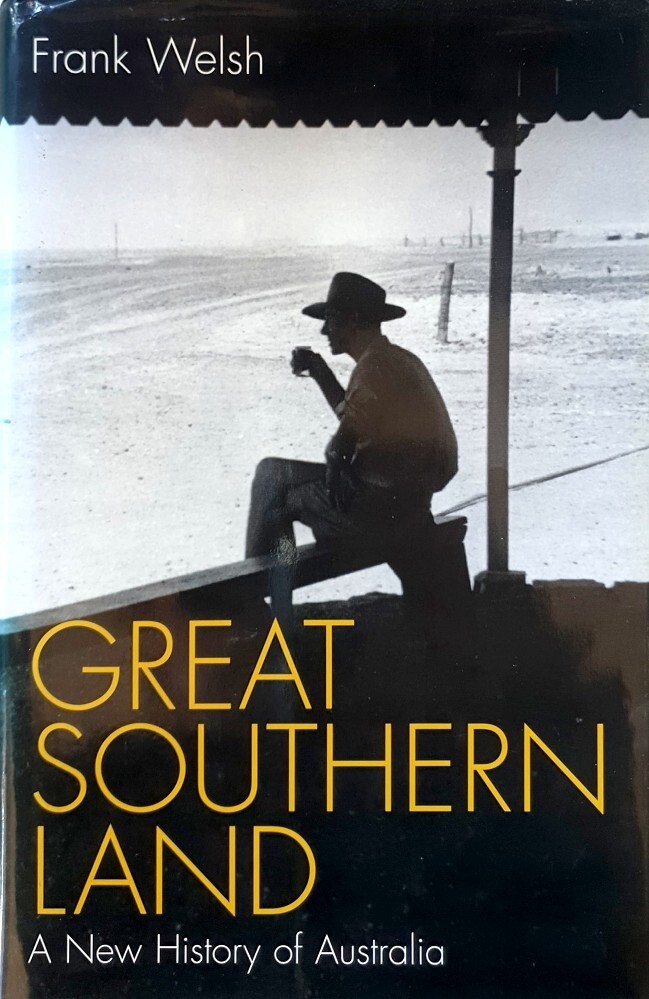
- Free Article: No
- Contents Category: Australian History
- Review Article: Yes
- Article Title: Big Englander
- Online Only: No
- Custom Highlight Text:
Frank Welsh is ill-served by his publicists. His history of Australia, we are told, is the first to be written by a non-Australian. It is not: the American Hartley Grattan wrote probably the best of a number of earlier such works. Great Southern Land is trumpeted as drawing on sources from Britain, the US, South Africa and Canada to place Australia fully in a world context: in fact, it incorporates some material from British archives and fragments from elsewhere to illustrate Australia’s more obvious international links.
- Book 1 Title: Great Southern Land
- Book 1 Subtitle: A New History of Australia
- Book 1 Biblio: Allen Lane, $49.95 hb, 758 pp
- Book 1 Cover Small (400 x 600):

- Book 1 Cover (800 x 1200):

The book is said to expose many previous misconceptions and national myths. Welsh is both a trained historian and a businessman; he has been a frequent visitor to this country, and has read widely in the historical literature. He brings the perspective of an urbane Englishman to our national story, but there is little to justify the subtitle of his book as ‘A New History of Australia’. Rather, it provides an appreciative and often shrewd assessment of Australia’s present preoccupations with its past. Welsh has a sympathy for Aboriginal Australia and admires the practical and robust character of national life, as well as the richness and diversity of contemporary Australian society. He sees Australia as a success story, an exemplar of Western democracy, and attributes the success to both good fortune and prudent leadership.
Welsh has created a lively narrative that is good on settlement and exploration, politics and government, imperial relation and international affairs. The appendix, providing lists of governors and prime ministers (of Great Britain, as well as of Australia) along with the British colonial and foreign secretaries, all under the title ‘Australian and British Rulers’, speaks eloquently of his interests.
Greak Southern Land is weaker on economic, social, intellectual and cultural history, weaker still on education, religion, the environment, the family and gender relations. The maps are useful, the illustrations sparse and unoriginal. His purpose is to ‘explain to the rest of the world how this remarkable society has evolved’ (and, accordingly, he writes of ranchers rather than pastoralists, dockers rather than wharfies, and provides a lengthy explanation of cricket); yet the qualities that he thinks characterise present day Australia and Australians – lack of deference and happy hedonism, plain spoken and at ease in the world with their directness and spontaneity – are assumed rather than explained.
An Australian reader will be struck by the errors. Many of the slips are perhaps inevitable, since the author lacks natural familiarity with his subject. To give just a few examples from the scores that I noted, he confuses John and Alexander Forrest, misattributes bankruptcy to Deakin, omits Western Australia from the second Federal Convention, gets the voting figures in the federal referenda wrong, turns Edmund Barton into Edward and has his ministry collapsing, confuses the House of Representatives with a House of Assembly, misunderstands Theodore’s transfer from state to federal politics, anticipates child endowment but puts six o’clock closing back a quarter century, has Menzies retiring a year too early and invents a fourth Liberal successor, gives Bob Hawke a career in a Labor Party Research Department and turns Bill Kelty into the president of the ACTU, describes John Kerr as short, transforms Peter into Richard Shack and has Ray O’Connor succeeding Brian Burke.
Welsh excuses the local scholars who provide advice and guidance from any responsibility for his mistakes with the disarming disclaimer of Samuel Johnson (‘ignorance Madam, pure ignorance’) and many of the slips that survived their emendations are trivial. Cumulatively, they do damage to the utility of Welsh’s work for Australian readers.
If Great Southern Land has a distinctive viewpoint, it is that of a Big Englander, a man of affairs conscious of his country’s imperial achievements as well as what remains of the British world now that Britain has given up its world role. He is at ease with this transformation and does not hanker for past imperial glories; rather, he celebrates the evolution of a fully independent Australia as a confirmation of Whitehall’s prudent tutelage, and it is this successful outcome that allows its proper acknowledgement. Part of his purpose, then, is to correct the parochial misconceptions of Australians about their colonial legacy. Perhaps inevitably, the lengthy passages that recall British statesmen and administrators in their dealings with a distant outpost sometimes carry the tone of Colonial Office minutes.
The Colonial Office often found it necessary to restrain the colonists in their treatment of Indigenous Australians and the operation of their public institutions, just as the City of London had to curb local extravagance and the British High Command needed to remind Australia’s wartime leaders of global realities. Welsh’s concentration on this dimension shifts the balance of Australian history to the point of imbalance: three of his fifteen chapters are taken up with the transition to self-government in the 1850s, and these are followed by a sketchy survey of what this allowed until he turns to the formation of a federal Commonwealth, again with a markedly imperial emphasis.
Welsh’s treatment of the Australian material has a strongly didactic cast. His endnotes occupy more than sixty pages and go far beyond the provision of references: he cannot resist correcting the misconceptions of Australian historians, or singling out this one for praise and that one for criticism. Yet his own knowledge of the historiography is, inevitably, incomplete and his familiarity with the history erratic. Among the more notable anachronisms are ‘the working man’s paradise’ (which he thinks was consummated in the early Commonwealth) and the social services power added to the Commonwealth Constitution in 1946 (which he thinks was part of the original). His grasp of the Labor Party is seriously awry (he keeps judging it against British Labour) and he is misled by Paul Kelly’s account of the Australian Settlement into seeing such unlikely figures as Malcolm Fraser as bearers of the Deakinite legacy.
To go on about further misconceptions would be churlish. Frank Welsh provides a valuable corrective to the parochialism of much Australian history, and he makes a generous assessment of its outcome. An outside perspective on a national history is to be welcomed, and Great Southern Land will do much more good than harm to the overseas readers for whom it is intended. Yet outsiders who contribute to American or French or British history are expected to be familiar with their subject and its literature. Why should it be any different with Australian history?


Comments powered by CComment